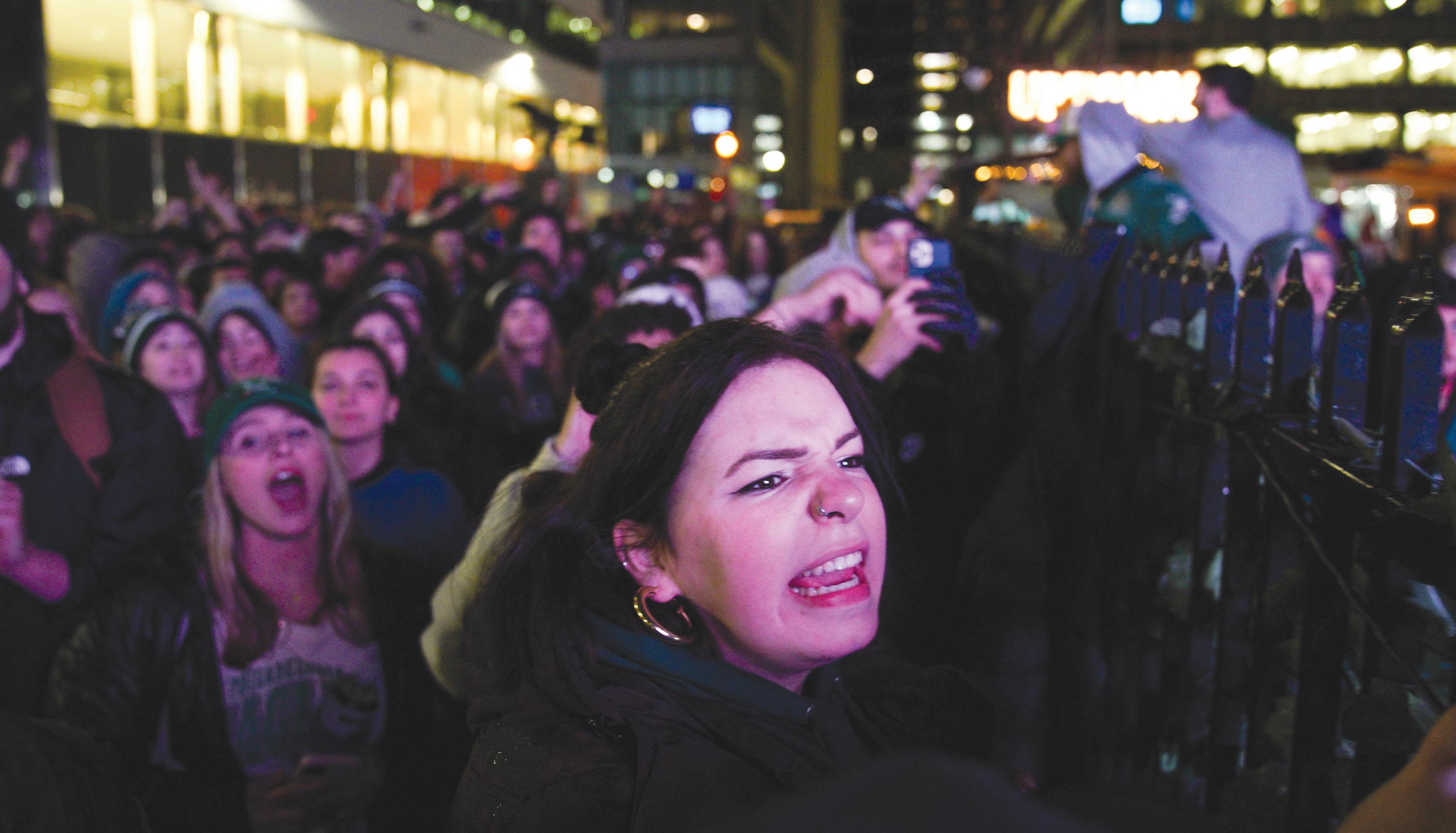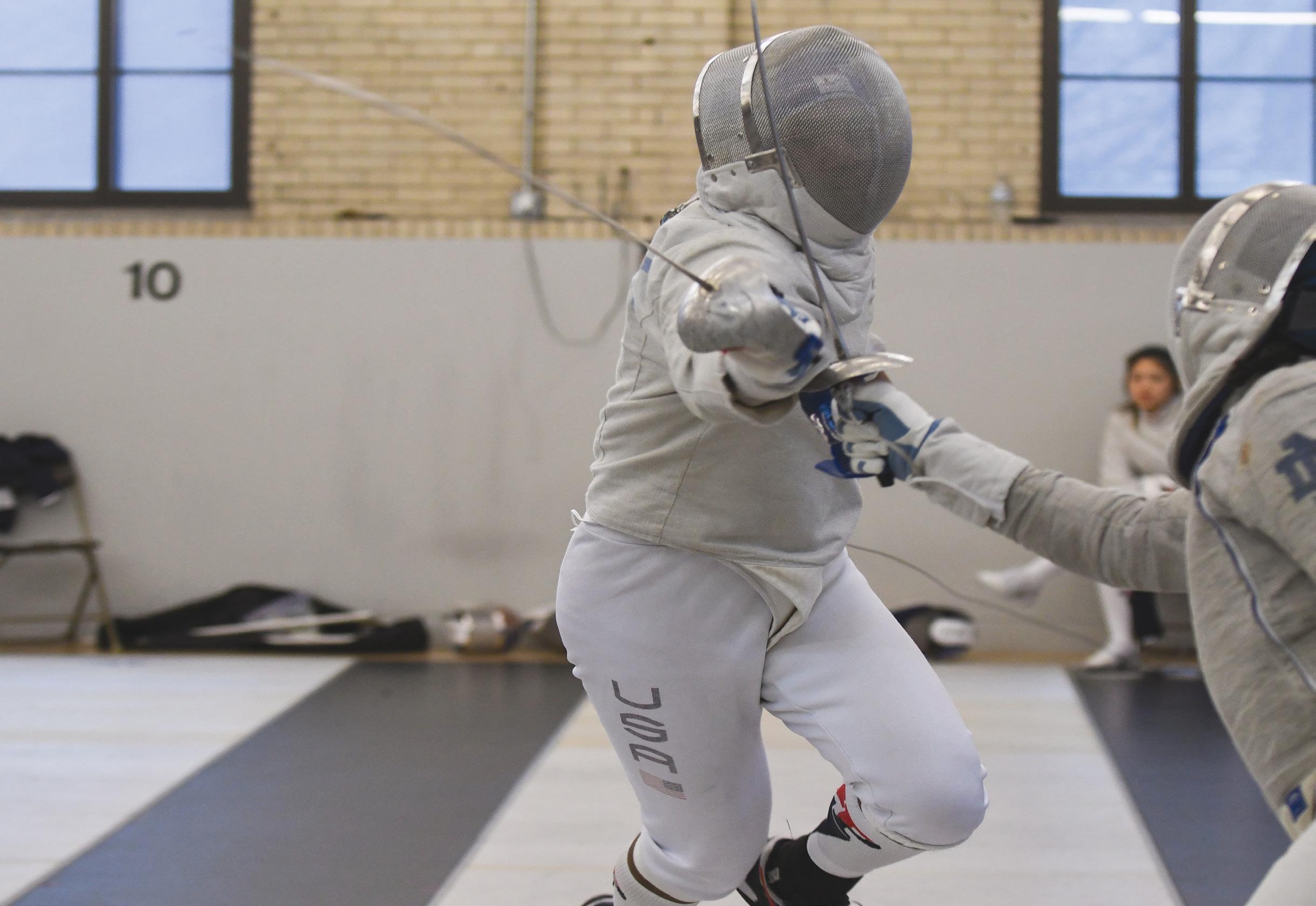BYE BYE, BIRDS
Instant reactions to Super Bowl LVII from the streets of Philadelphia

Thousands gathered downtown after the game, celebrating the season and mourning missed opportunities
CALEB CRAIN
Sports Editor
As the Kansas City Chiefs were crowned Super Bowl LVII champions, crowds gathered throughout Philadelphia to mourn a season where the Eagles were so close to their second Super Bowl victory. Instead, the Chiefs have their second championship in four years, while the Eagles remain at one.
Thousands milled around Center City soon after the final whistle blew and defeat was in hand. The mood was largely somber and bitter as those who had been watching the game downtown spilled out of bars and into the streets.
Many students had been watching the Super Bowl at various locations around campus. Several college houses hosted watch parties, and the University sponsored an event at Houston Hall, which was attended by hundreds of students and staff members.
At the events, students described how this Eagles season brought them all together.
“I consider Philadelphia my new home for these four years,” College sophomore Jake Maeng said from Lauder College House. “I just like to see everyone rally around the Eagles.” Downtown, hundreds of police officers were present to control the crowd and deter violence. Preparations had been underway for days, with the city greasing light poles and Broad Street, closed to traffic for several blocks around City Hall.
Of course, these efforts were designed for a celebratory crowd. Instead, those in Center City seemed to have little interest in climbing poles, preferring instead to keep two feet on the ground. Sirens and chants of “F**k the Chiefs” provided the soundtrack for the dejected crowd.
While most in attendance were peaceful, elements of the crowd turned violent, with fights breaking out and bottles being smashed.
The game was tight throughout, with the Eagles leading for much of the first half. But the Chiefs offense was ruthless in the second half, with Patrick Mahomes, who was named the game’s MVP, making plays to set up a gamewinning field goal.
Much of the anger was directed at the referees, with one person downtown, who declined to be named, screaming to the crowd “that ref can rot in hell.”
For students who supported the Kansas City Chiefs, Sunday’s result made up for the insults they’d received over the past two weeks.
“I totally would have loved to have days off [following an Eagles win], but not more than I
See EAGLES, page 7
Turn
Engineering Ph.D. students call for increase to doctoral stipend in letter to administration
The letter comes after Penn announced the largest one-time increase to the minimum Ph.D. stipend in December
NICOLE MURAVSKY
KATIE BARTLETT AND
Staff Reporters
Students work in the Peter Detkin Lab, which is part of Penn’s Electrical Systems
Seventy-two Electrical and Systems Engineering Ph.D. students sent a letter to department leadership demanding an increase in the minimum doctoral stipend to $50,000 for the upcoming academic year.
The letter — which was sent to ESE Department Chair George Pappas, Associate Dean for Graduate Programs Boon Thau Loo, and ESE Graduate Chair Troy Olsson — comes after Penn announced the largest one-time increase to the minimum Ph.D. student stipend in December. In the letter, the ESE students requested greater recognition and benefits from the University, citing the increased popularity of their field.
The Office of the Provost, which announced the stipend increase, declined to comment on the letter. In November, Penn increased the minimum Ph.D. stipend from $30,547 to $38,000 and will be in effect at the start of the 2023-2024 academic
year. In the letter, the ESE students wrote that "one could only conclude" that the University expects doctoral students to conduct "world-class research" while living "at or below the minimum standard of living."
According to a second-year ESE Ph.D. student, who requested anonymity due to fear of academic retaliation, the letter stemmed from a “general feeling” among the department’s graduate students about their Penn experience.
“We often discuss our financial situations when we’re sitting around the table at lunch,” the student said. “It got to a point where we felt like we needed to take some action to do something.”
In the letter, the students emphasized the benefits that the University gains from ESE research as well as Penn's plans to invest $750 million in engineering and data science infrastructure, which
will attract top students and faculty.
“From our phones to the machines we interact with on the streets, the machine learning systems I study permeate many aspects of our lives,” the second-year student said. “To be able to conduct this research, you need to be comfortable and have a livable wage.”
Owerko said that a lack of value placed on his work by the University and its resulting toll on graduate students' mental health and quality of life were his main reasons for contributing to and signing the letter.
“It can be demoralizing to see my peers from undergrad progress into their careers while I’m still a student,’” Owerko said. “I often ask myself ‘What am I doing here?’ If the University doesn’t value my work, maybe I shouldn’t be here.”
See PHD, page 7
New math sequence offered to economics majors
The math department created two courses for students in social sciences, replacing MATH 1400 and MATH 1410
YASH RAJPAL Staff Reporter
Economics majors at Penn are no longer required to take MATH 1400: “Calculus I” and MATH 1410: “Calculus II” after the creation of two new math courses.

In an attempt to adapt Penn’s math curriculum to students of all disciplines, the Math Department created two new courses tailored to students of the social sciences, specifically the cconomics major. The new courses — MATH 1070: “Mathematics of Change I” and MATH 1080: “Mathematics of Change II” — can now be taken to fulfill the mathematics requirement of the
economics major. Prior to the fall 2022 semester, students who were required to take the introductory and multivariate calculus sequence — such as economics majors — had to take both MATH 1400: “Calculus I” and MATH 1410: “Calculus II.” While the economics major still accepts MATH 1400 and MATH 1410, Department of Economics Undergraduate Chair Francis Diebold said that MATH 1070 and MATH 1080 are now the preferred calculus sequence. These courses, often considered some of the
least popular courses at the University, have received pushback for their teaching practices, including the flipped classroom format and weekly quizzes. MATH 1400 and MATH 1410, which were recently adapted to an engineeringfocused curriculum, are also heavy on physical science applications.
The new courses, MATH 1070 and the subsequent MATH 1080, do not use the flipped classroom format and are intended to provide a See ECON, page 7
CONTACT US: 215-422-4640 SEND STORY IDEAS TO NEWSTIP@THEDP.COM ONLINE AT THEDP.COM THE INDEPENDENT STUDENT NEWSPAPER OF THE UNIVERSITY OF PENNSYLVANIA • FOUNDED 1885 PHILADELPHIA, THURSDAY, FEBRUARY 16, 2023 VOL. CXXXIX NO. 6
PHOTO BY ABHIRAM JUVVADI
and Engineering Department, on Feb. 8.
to page 11 to see how the DP captured the Super Bowl and its aftermath on and off campus last Sunday
PHOTO BY ANNA VAZHAEPARAMBIL
Student groups organize funds to support earthquake relief in Turkey, Syria
A coalition of student groups are raising money for the Syrian American Medical Society and AKUT
 CASSIDEE JACKSON Staff Reporter
CASSIDEE JACKSON Staff Reporter
Student leaders are organizing relief efforts for victims of the Turkey-Syria earthquakes, which have killed tens of thousands of people.
The Penn Arab Student Society, Fenjan: The Middle East Journal, Penn Muslim Students Association, Penn Afghan Students Association, and Penn Students Against the Occupation are collecting donations to provide immediate relief to survivors. As stated in their joint social media post, donations will be sent to the Syrian American Medical Society, which operates on the ground in Northern Syria, and AKUT, a non-governmental organization providing search and rescue missions across Turkey.
“The destruction is on a scale that I could have never imagined," social media Manager for the Penn Arab Student Society and College junior Summer Maher said.
Other leaders added that their first response was to organize in an effort to help the affected region.
Co-founder of Fenjan, President of PSO, and College senior Laila Shadid told The Daily Pennsylvanian that she was “shocked and devastated” by the earthquake’s destruction and “immediately wanted to look for ways to raise money and help in whatever way we could.”
Student leaders — who jointly decided to organize the donation drive — promoted it on social media and their organization's respective
listservs. The leaders said that the collaboration has helped strengthen their efforts.
“I think especially with a lot of student groups and activism group that the best way to [make a change] is to work together," MSA President and Wharton junior Rayane Taroua said.
According to Maher, their donation drive has received support from the Undergraduate Assembly, the College Dean’s Advisory Board, and other organizations.
Penn Medicine has pledged to match donations dollar-for-dollar the first $50,000 in community donations towards Turkey-Syria earthquake relief efforts.
Penn has yet to issue an official statement on the earthquakes or help organize fundraising efforts.
In a letter sent to Penn administrators — including President Liz Magill — and signed by Middle East Center Director Harun Küçük, community members petitioned Penn to issue a statement, help in fundraising efforts, and consider matching donations collected through the community effort.
"Many students, faculty, and staff members are ready to help and are already helping on and individual basis with channeling resources to the region, Küçük wrote in the letter "The University's help in supporting these efforts will be invaluable."

Two earthquakes with magnitudes of 7.8 and 7.5 rocked southeastern Turkey and northwestern Syria on Feb. 6. Over 36,000 people have been killed and more than 75,000 people have been injured. Death and injury tolls are expected to increase as international rescue efforts continue.
Despite their relief efforts, student leaders told the DP that they feel that community response has been mixed, citing that students without a connection to the region might be apathetic to the earthquakes.
“I would say that I think a lot of people feel this issue is very removed from them and [in] their lives, especially if they don’t have connections to that region of the world,” Shadid said.



Maher added that although the disaster occurred in a different region, the Turkey-Syria earthquakes are still one of the biggest natural disasters of the century.
“The fact that it didn’t happen here doesn’t mean that it doesn’t affect us because at the end of the day, these are human lives that are at risk and will continue to be at risk because of this for months and years to come,” Maher said.
Penn to face retaliation complaint involving alleged sexual misconduct by former CAPS director
The student claims that the University charged her a higher fee to re-enroll after she sued Penn
KATIE BARTLETT Staff Reporter
A district court judge ruled that a Penn student can proceed with Title IX and American with Disabilities Act claims against the University.
On Jan. 31, the United States District Court for the Eastern District of Pennsylvania ruled that April Ploeger — who first enrolled as an undergraduate in 2006 before being granted multiple leaves of absence — can proceed with two of four standing claims against Penn. Ploeger claimed that the University charged her a higher fee to re-enroll after she sued Penn for facing sexual advances from former Counseling and Psychological Services Director William Alexander.
In response to a request for comment, University spokesperson Ron Ozio said that Penn does not usually comment on litigation that is pending. Ozio cited how the University made a partial motion to dismiss some of the claims made in Ploeger’s complaint.
“It is worth noting that at the motion to dismiss phase of a case, the court is required to accept as true the allegations in a plaintiff’s complaint,” Ozio wrote to The Daily Pennsylvanian. “Penn denies the allegations and intends to vigorously defend this case.”
The court’s opinion said that when Ploeger first enrolled at Penn in 2006, she reported her diagnosis of an autoimmune disease, depression, and anxiety to the Office of Disability Services. Disability Services then granted Ploeger several requests for leaves of absence and test-taking accomodations for medical reasons between 2006 and 2015.
In 2009, Ploeger received counseling from Alexander, who began his role as director of CAPS that year and retired in 2018. She alleged that during these counseling sessions, Alexander made inappropriate sexual advances, touching her at least once without consent. These advances led Ploeger to attempt suicide in 2009, after which Alexander allegedly told her to “go home and put a Band-Aid on it,” according to her complaint. Ploeger attempted suicide again in 2015 by overdosing on medication prescribed to her by Alexander. He allegedly wrote her another prescription following this attempt but did not direct her to further mental health treatment.
Ploeger reported the alleged misconduct to Alexander’s supervisor and then-Penn President Amy Gutmann in 2015. Alexander allegedly threatened her in response to these reports.
Before the start of the spring 2016 semester, Ploeger allegedly applied for the same accommodations she had received since 2009. The opinion then states that the University required that Ploeger meet with CAPS
personnel to be granted the accommodations and denied her request to have a witness or advocate present in the meeting. She decided not to re-enroll at Penn as a result. She said that CAPS did not respond to her subsequent requests to set up a conversation with a counselor.

In the spring of 2018, Ploeger allegedly re-enrolled by sending a ‘return from leave’ letter, but did not sign up for classes because she was “fearful of further retaliation,” as quoted in court documents. She then attempted to re-enroll for the fall 2018 semester, but the University allegedly rejected her re-enrollment request.
Ploeger filed her initial complaint against Penn on April 1, 2020, in the Philadelphia Court of Common Pleas. After she requested to re-enroll at Penn in 2021, the complaint said that the University required that she pay a fee of several thousand dollars, an increase from what the complaint said was an initial demand for hundreds of dollars to re-enroll before she sued.
Ploeger has filed a series of complaints since April 2020. The court said that her assertion that the University imposed a higher re-enrollment fee following the lawsuit was sufficient to uphold the retaliation claims. The other claims have been dismissed.

The dismissed claims include breach of contract, in which Penn allegedly did not provide its promised free, high-quality health care; and negligent supervision due to the University’s failure to supervise Alexander and terminate him after her report. The court dismissed both claims because they are barred by statute of limitations.
Ploeger is represented by Trial Law Firm, LLC. The University is represented by Tucker Law Group. Ploeger’s law firm did not respond to a request for comment, while Ozio responded to the DP’s request for comment from Tucker Law Group.

2 NEWS THURSDAY, FEBRUARY 16, 2023 | THEDP.COM THE DAILY PENNSYLVANIAN THE SEVENTH ANNUAL PENN ARTS & SCIENCES Join us for a day of TED Talk-style presentations by Penn Arts & Sciences graduate students representing the Humanities, Social Sciences, Natural Sciences, and Professional Master’s programs as they compete for first place within their category. Participate in the event by voting for the overall Audience Choice winner. Refreshments served throughout the day, including vegan and vegetarian options. SPEND AN AFTERNOON WITH SOME BIG IDEAS AND FUN COMPETITION #PennGradTalks | #PGT @PennSAS FRIDAY, FEBRUARY 24 SESSIONS START AT 12 P.M. WIDENER LECTURE HALL PENN MUSEUM 3260 SOUTH STREET Testing the Reward-Drinker Hypothesis of Naltrexone Using an Extended-Release Formulation
study is being conducted to compare the effects of a medication (extended-release naltrexone or XRNTX) or placebo (an inactive substance) together with brief counseling on reducing or stopping drinking. To participate in this study, you must be: • 18-65 years old • Express a desire to reduce or stop drinking • Able to complete all study visits and willing to receive 2 injections of study medication over 8 weeks of treatment. This is a 7 visit study to occur over 12 weeks. This includes an initial screening visit, an 8-week treatment phase (during which time you will receive 2 injections at 4-week intervals of XR-NTX or a placebo), and a follow-up visit 4 weeks after the treatment phase. Participants may be compensated up to $345 if they are eligible to participate and complete all study visits. University of Pennsylvania MARDI GRAS PARTY on Fat Tuesday Feb 22, 2023|11:30am-10pm $6 Hurricanes with 2 shots of bacardi (SILVER & Black)
This
PHOTO BY IPEK OBEK
Penn student leaders are organizing efforts to collect donations to provide relief to earthquake survivors.
PHOTO BY CINDY CHEN
The Penn student sued in 2020 for facing sexual advances from former Counseling and Psychological Services Director William Alexander.
Protestors disrupt Magill speech at alumni event
After interrupting the event, community members and students joined the demonstration outside Hunstman Hall
IMRAN SIDDIQUI Senior Reporter
A group of student protestors interrupted a Penn Alumni event featuring President Liz Magill on Feb. 10, urging Penn to preserve the University City Townhomes as affordable housing.
The protestors, affiliated with Fossil Free Penn, disrupted the class presidents Event dinner on Huntsman Hall's eighth floor at 7 p.m. for around five minutes, beginning while Magill was delivering remarks. After exiting the building, community members from the Coalition to Save the UC Townhomes and other students joined the demonstration as the group of nearly 50 marched from Huntsman Hall to the UC Townhomes.
The group is demanding that Penn commit $10 million to the preservation of the UC Townhomes, according to College senior Gigi Varlotta, one of the demonstrators who interrupted the event. They said that once Penn makes this commitment, they believe that other institutions across Philadelphia — including Drexel University and the University Hospitals — will follow suit.
"Penn is the most influential player in the city," Varlotta said. "The reason that the [UC Townhomes] are being sold is because of Penn's history of expansion and displacement in West Philadelphia."
Penn Alumni did not respond to a request for comment. University spokesperson Ron Ozio wrote, "Intentionally disrupting a private event with a bullhorn is inappropriate and inconsistent with our values."
The protestors carried banners into the event displaying their demands while chanting "Save the UC Townhomes" and "housing is a human right."
Varlotta alleged that the alumni and former class presidents were not happy with the demonstration, claiming that one person pushed Varlotta's bullhorn into their face.

"They were angry, and I said I'm angry too, because my friends are losing their homes," Varlotta said. "I said that if Magill and the administration had listened to their students, we wouldn't be here today."
Following the interruption at the class presidents event, the group left Huntsman Hall and convened with other demonstrators on the corner of 38th and Walnut streets where residents of the UC Townhomes spoke about their demands for the University.
"We will win out," Mel Hairston, a UC Townhomes resident, said at the demonstration. "No matter how long this takes, and no matter how long we have to go through the processes, we will win."
Around 7:20 p.m., demonstrators marched down Walnut Street and stopped in front of the nowclosed McDonald's location near campus — which is in the process of being redeveloped into a mixedused office building operated by Penn with a new McDonald's on the first floor. Here, protestors demanded that the University take accountability for its role in the gentrification of West Philadelphia. The demonstration ended at the UC Townhomes. Recently, the eviction deadline for the residents of
the UC Townhomes has been extended until Feb. 21. Residents in 13 out of 70 units are still living on the site, according to The Philadelphia Inquirer.
The UC Townhomes are a rental property located at the corner of 39th and Market streets. Since the property's owner, IBID Associates Limited Partnership, announced its decision to sell the UC Townhomes last year, residents, student and local activists, and the city council have organized opposition against the sale and what the effects of displacement and redevelopment could mean for the city.
Previously, the University has said it is committed to helping tackle the City's issue of affordable housing.
In September, Penn announced it would partner with Rebuilding Together Philadelphia, a local community revitalization organization, to assist approximately 75 West Philadelphia low-income homeowners. Administrators also asked faculty at the Penn Institute for Urban Research to produce a “comprehensive study” with “actionable strategies” on how the University can support the increase of affordable housing and determine “best practices” for partnerships between the
University and the West Philadelphia community.
Penn does not own nor has plans to purchase the UC Townhomes property, and administrators have said that it does not have any direct control over the redevelopment plans for the Townhomes property site.
Previously, FFP interrupted Penn's Homecoming football game in October, delaying play for over an hour. Protestors from Save the UC Townhomes also interrupted Convocation for the Class of 2026 last semester.
Varlotta said that student activists and community members will continue to disrupt University events until Penn meets their demands. Regardless of any direct control, Varlotta said that it is the University's "duty and responsibility" to preserve affordable housing in West Philadelphia.
"We are here to show Liz Magill that the University does not get to have their little dinners and their fancy events when students and community members are fighting for their lives," Varlotta said. "Sorry that your event was disrupted, but we're more sorry that people are losing their homes."
Senior reporter Jared Mitovich contributed reporting.
Proposed Clark Park master plan includes public bathrooms, increased accessibility
Friends at Clark Park has been working on the master plan for 18 months and is now halfway through the community engagement phase HALEY SON Staff Reporter
A new master plan for Clark Park in West Philadelphia is in the works, with discussion of installing public bathrooms and making the playground accessible for children with disabilities.
Friends of Clark Park, a local volunteer organization, initiated the plan, and University City District, Philadelphia Parks & Recreation, and other partners are supporting the planning process. The plan focuses on generating ideas for improvements to the park and the community's needs, according to Andrew Bowers, board president of Friends of Clark Park.
“The goal of this master plan is to make the park better for everyone using it on a daily basis, but also better for the large-scale events that come to the park,” Chris Richman, the director of marketing and communications at University City District, said.
When the master plan was announced, Bowers said that community members expressed concern because they thought the plan was going to negatively change the park.
“One of the biggest challenges is convincing people that anything needs to be done at all,” Bowers said.
College junior Noah Lewine — who lives around the corner from Clark Park and goes to the park every week — said that while he does not think the park is run down, he agreed it would benefit from some renovations.
Friends at Clark Park has been working on the master plan for 18 months and is now halfway through the community engagement phase. It hopes to release the finalized plan in April, according to Bowers. He added that the master plan is roughly estimated to be implemented by the end of 2024, although an end date is hard to set in stone since it is still in the planning phase.
Studio Bryan Hanes — a local design firm that has been hired for the project — has developed four

schemes, each with different features. A second online survey — which is currently open to the public and has almost 400 responses — asks participants to evaluate individual components of each scheme, such as the updated playground and new walkways.
One of the main improvements brought up is making the park more accessible to those with mobility issues, according to Nathan Hommel, director of planning and design at UCD.
“We certainly want to make sure that the [updated] playground allows people with mobility issues to get to it,” Hommel said.
There have also been requests from the community to add a public bathroom to Clark Park, according to Hommel.
“[Having a public restroom] is just an absolute human basic need," Bowers said. "It’s something that we really want to get done this time."
In an emailed statement to The Daily Pennsylvanian, Sarah Peterson, communications director at the Office of the Mayor, wrote that the Department of Health and Human Services said that the new public restrooms would be maintained and cleaned frequently.

In the comments section of an article published in West Philly Local, some users expressed concern about public bathrooms and additional seating attracting more unhoused people to the park. Lewine said that he hopes that the planners do not add any anti-unhoused architecture when considering the redesign.
UCD and Friends of Clark Park said there wouldn’t be any disruption to the park’s normal activities. Hanes said it would depend on the plan’s specifics, such as potentially updating the current playground.
“Clark Park is the front yard for the community," Hanes said. "I don't know of another park in the country that has such a diverse population of users and activities."



Luxury suburban 1 bedroom apt. for rent. Walk to RR and be at Penn in 20 minutes. 4 rooms (670 sq ft). MB with walk in closet AC, W/D, large deck, fenced in yard and off street parking. $950. No pets. Call 610-453-4124
Zuberi
Register Via Eventbrite

3 NEWS THURSDAY, FEBRUARY 16, 2023 THEDP.COM | THE DAILY PENNSYLVANIAN Majors & More Majors & More Majors & More Dinners Majors & More Dinners Each semester, the College in collaboration with the College Houses and academic departments and programs holds a series of dinner discussions on majors, minors and academic programs. These dinners provide an opportunity to meet with faculty and upperclass students in a small, relaxed setting, and are free of charge. Please RSVP by the required date at the URL below. Contact Rupert Neish at rneish@sas.upenn.edu with any questions. http://www.college.upenn.edu/dinners/ February 21 @ 6:00 PM | RSVP by February 17 English Majors & More Hill College House February 22 @ 6:00 PM | RSVP by February 18 Urban Studies Majors & More Rodin College House February 23 @ 6:00 PM | RSVP by February 19 Earth & Environmental Sciences & More Harnwell College House February 27 @ 6:00 PM | RSVP by February 23 Penn Museum Majors & More Harrison College House http://www.college.upenn.edu/dinners/ The Inaugural W.E.B. Du Bois Lecture in Public Social Science A Conversation with Dr. Brent Staples Moderated by Dr. Tukufu Zuberi
5:00pm Room
Annenberg School for Communication Moderated by Dr. Tukufu
Thursday, February 23, 2023
110
PHOTO BY ANNA VAZHAEPARAMBIL
50 community members from the Coalition to Save the UC Townhomes and other students marched down Walnut Street on Feb. 10 in protest against Penn’s role in the gentrification of West Philadelphia.
PHOTO BY KYLIE COOPER
The local volunteer organization Friends of Clark Park is initiating a new master plan for Clark Park in West Philadelphia to install public bathrooms and make the playground accessible.
THIS YEAR’S BOARD
When “let’s be casual” replaces “be mine”

LEXI’S TAKE | The lost art of love and meaningful connection
"You’re the anti-hookup culture girl, right?”
For a month or so last year, my frat party conversations were dominated by a popular opinion column I wrote last Valentine’s Day. “Is finding Mr. Right at Penn all wrong?” cited concerns about the prolific hookup culture at Penn. A year’s worth of insight later, I have come to realize that the problem is much deeper and more complicated than meat market style casual sex. Our generation is missing genuine, serious connections. While this problem is not limited to Penn students, it is often exasperated by our competitive and transactional culture. Rather than causing our lack of substantive and long-term relationships, hookup culture is a symptom of a larger problem.
If one thing can be said of our generation, it is that we are exceedingly casual. Jeans are considered fancy, we replace virtually every phrase with abbreviation or slang (“lol such a slay”), and we consider handshakes to be an outdated ceremonial procedure (“dap me up”). It’s safe to say that this shift has affected the way we approach relationships as well. With dwindling attention spans and increasingly self-centered and present-focused outlooks, most of our connections have become superficial, short-lived, and dangerously transactional.
As the first generation coming of age with social media and extreme oversaturation of technology, this stripped-back and instant gratification oriented culture is unsurprising. Dating apps from Tinder to
Bumble and even Hinge have capitalized directly on this. Over 74% of millennials and Gen Zers use dating apps, spending approximately two hours a week swiping. With the limited access to information and intimacy on dating apps, they lend themselves to the unique phenomena of the modern age: catfishing, ghosting, and the like. People are able to start and end entire interpersonal romantic relationships without having to ever confront their partner face to face. The days of love where you’re “screaming and fighting and kissing in the rain,” to quote Taylor Swift, seem to be fading.
Dating via social media is not only superficial due to a scarcity of information, but also from the lack of commitment that it encourages. A University of Texas study found that people were more willing to make their relationships work when they didn’t have alternatives, therefore indicating that when a perceived better offer is available, people are more likely to abandon their current partner. Psychologists have applied this to dating apps — making the number of optional partners virtually limitless has exacerbated the commitment issues imposed by the “better offer” phenomenon. In theory, this unlimited number of potential partners should make it better for people to find their soulmates — that is the philosophy behind dating apps, after all. However, the opposite seems to be true. 75% of Gen Z is single and our close generational peers, millennials, are getting married at lower rates than any
generation before them. This is accompanied by an increase in shorter ‘on-again, off-again’ relationships, as well as the notoriously common situationship (a staple at Penn). While these types of relationships often guarantee less time investment, a lower perceived risk of being hurt, and the availability of alternative options, they more often than not strip people of the opportunity to develop substantive connections. Without emotional investment and commitment, ‘relationships’ become transactional: vehicles for sex and instant gratification until the next best thing comes along.
This issue isn’t limited to our romantic relationships either. Despite our greater desire for mentorship than previous generations, Gen Z is wanting for mentors.
This is unsurprising when I think of my peers at Penn. When I cite the close relationship I have with one of my professors, I am struck that the first reaction from my peers is, “wow, they are going to write a great recommendation letter!” Rather than developing deep connections with those from whom we have so much to learn, our self-centered, superficial, and casual generation perceives our interactions as first and foremost transactional.
Relationships of convenience often characterize our friendships as well. It is a regular occurrence to hear complaints of social climbing, lack of substance, “sceney” behavior, and general social superficiality at Penn. While I have been lucky enough to meet some of the best and most supportive friends of my life, these
accusations are not unfounded. Everyone has experienced it in some capacity or another, and millennials and Gen Z have been broadly accused of less empathy than our predecessors.
The recent sex survey from The Daily Pennsylvanian shows just how much this is affecting our sexual activity as well. A third of students do not feel satisfied with their sex lives, with many citing hookup culture and an absence of “sustained romantic connections” as reasons for their dissatisfaction, proving how our mentality about relationships is clearly flawed. Further, the survey asked about “best sex stories” and quantity of partners, rather than anything about preference for sex in committed relationships or romantic history, and this is indicative of our continued glorification of casual and often transactional sex.
The reality is, despite being the most sexually fluid generation, a status that is colloquially regarded as empowering or progressive, we are struggling greatly with intimacy. Until we begin to develop deeper, more substantive bonds with the people in our lives, romantic interests or otherwise, we will continue to lack vulnerability, intimacy, trust and, ultimately, love. So, unless you want to receive candy conversation hearts that say “let’s be casual,” we need to rethink how we approach relationships.
LEXI BOCCUZZI is a College junior studying philosophy, politics, and economics from Stamford, Conn. Her email is boccuzzi@thedp.com.
Patagonia privilege: The on-campus housing rip-off
A BRIT ABROAD | Penn’s housing lottery produces intolerable inequality
former-President namesake, in which she announced that every single resident of the new house would be gifted a free sweater — from Patagonia, no less — with the building’s name embroidered on the sleeve. Residents of other college houses are rewarded for their perseverance in seriously adverse conditions with printed t-shirts as house merch. The staggering contrast would be hilarious if it weren’t so unjust.

The worst part of all of this, though, is that those living outside of Gutmann, most of whom are given no alternative to living on campus and got their rooms through a random lottery, have to pay the exact same rent price for what is an unequivocally far worse experience. While I’ve been lucky enough to move to Gutmann this semester, I’ve seen the same bewilderment I once felt on the faces of incoming exchange students when they walked into my room for the first time, wondering how on Earth I’d managed to score such a place. After all, if Penn can afford to give me such luxury, why weren’t they receiving the same treatment for the same price?
The day I was accepted into Penn remains one of the most exciting days of my life; it was the culmination of years of work aimed at getting an exchange offer at one of the best schools in the United States and, indeed, the world. But while the thrill of coming here was incredible, the sobering financial reality of studying here quickly set in. I soon had to explain to my parents that, unlike my friends going to other U.S. schools who could live in private accommodations, I had no choice but to pay almost $12,000 (about $1,300 a month) for Penn housing. The average rent at home sits at less than half of that. And, what was worse, there was a chance I’d have to share a bedroom, something that students rarely have to do in the U.K.
Penn’s housing system requires that all first-year, sophomore, transfer, and exchange students live on campus, while other students are given the option to stay or leave. While Penn’s website suggests that you have an open choice of college house,
the reality is that rooms are allocated via a lottery in which students are randomly given a time slot to choose rooms. The living situation of thousands of students is left up to pure chance, leaving many of them dissatisfied and miserable. Were all of Penn’s living locations of roughly equal quality, this system could at least be argued as equitable. The reality, though, is that some lucky students live in luxurious, brand-new dorms while others live in rundown and outdated buildings. As for me, my chances at this lottery were even worse than I’d imagined. Exchange students don’t even get to apply for rooms until June, many months after fulltime students choose theirs. The result is that we are left with the rooms that nobody else wants. So, although I had obviously put the then-called New College House West as my top choice in the hopes of getting my own bedroom, I ended up in a tiny, two-person, shared-bedroom apartment in Rodin. While Rodin was average but tolerable,
it wasn’t until I visited some of my friends’ apartments in the newly-named Gutmann that I truly understood the extent to which I was being ripped off. They were living in a beautiful, brand-new building with single bedrooms, spacious living areas, study rooms, and an exercise suite to boot; meanwhile, my shared room barely had space to breathe in, never mind any semblance of privacy, and my shower took about a minute to heat up every morning.
My experience is far from unique and certainly not the worst; recent disasters in Penn houses have only served to demonstrate how great its inequalities are. In just the past few weeks, there has been a huge increase of rodent sightings in Kings Court English College House and several residents of Harrison College House have had to vacate their rooms entirely due to extensive flooding. The Quad, meanwhile, has long been infested with mold. At the same time, Gutmann had a lavish official opening ceremony attended by its
It is clear that there is serious inequity here that leaves many students feeling rightfully screwed over. The prognosis is simple: Penn cannot continue to force their students to pay extremely high rent prices for clearly inadequate facilities without any option of moving off-campus. Either lower the rent for those in the clearly worse accommodations — and no, that doesn’t mean raising prices by 20% for nicer accommodations, as they did with the Radian — or allow students to move off campus. Failing to do either is a blatant abuse of monopoly power which demonstrates both greed and a serious disregard for their students’ well-being. For one of the world’s best economics and business schools which claims to care about its community, you’d think they’d be above such inconsiderate inefficiency. So while I love my new fleece, putting it on only serves as a reminder of the undeserved privilege I received for winning Penn’s housing lottery, and the unfair treatment the “losers” have to face.
ALEX BAXTER is a junior on exchange from the University of Edinburgh studying politics, philosophy, and economics in the College. His email is ajgb@sas.upenn.edu.
4 THURSDAY, FEBRUARY 16, 2023 | THEDP.COM THE DAILY PENNSYLVANIAN OPINION
Opinion
DESIGN BY INSIA HAQUE
PHOTO BY JON WONG
The Land on which the office of The Daily Pennsylvanian stands is a part of the homeland and territory of the LenniLenape people, known to the original Indigenous people as “Lenapehoking.” We affirm Indigenous sovereignty and will work to hold The Daily Pennsylvanian and the University of Pennsylvania more accountable to the needs of Native American and Indigenous people. LAND ACKNOWLEDGEMENT JOSEPHINE BUCCINI Deputy Design Editor WEI-AN JIN Deputy Design Editor SOPHIA LIU Deputy Design Editor ESTHER LIM Deputy Design Editor ABHIRAM JUVVADI News Photo Editor BENJAMIN MCAVOY-BICKFORD Opinion Photo Editor DIAMY WANG Deputy Copy Editor CHARLOTTE BOTT Deputy Copy Editor MADDIE PASTORE Deputy Copy Editor RILEY NEEDHAM Deputy Copy Editor WALKER CARNATHAN Deputy Sports Editor EMILY CHANG Deputy Opinion Editor VINAY KHOSLA Deputy Opinion Editor YOMI ABDI Deputy Opinion Editor JESSE ZHANG President EMI TUYẾ TNHI TR ẦN Executive Editor IMRAN SIDDIQUI DP Editor-in-Chief LILIAN LIU Design Editor COLLIN WANG Design Editor JARED MITOVICH News Editor MOLLY COHEN News Editor SAYA DESAI Assignments Editor ALLYSON NELSON Copy Editor JULIA FISCHER Copy Editor ANNA VAZHAEPARAMBIL Photo Editor CAROLINE MAGDOLEN Opinion Editor KIRA WANG Social Media Editor CALEB CRAIN Sports Editor ALEXIS GARCIA Sports Editor GEORGE BOTROS Video Editor RIANE LUMER Podcast Editor MATTEO BUSTERNA Diversity & Inclusion Director JOSH TRENCHARD Business Manager GRACE DAI Analytics Director MADISON SMITH Marketing Manager KRISTEN LI Product Manager AKANKSHA TRIPATHY Consulting Manager ZAIN QURESHI Finance Manager 139th Year of Publication Have your own opinion? Send your letter to the editor or guest column to letters@thedp.com. Editorials represent the majority view of members of The Daily Pennsylvanian, Inc. Editorial Board, which meets regularly to discuss issues relevant to Penn’s campus. Participants in these meetings are not involved in the reporting of articles on related topics. LETTER SUBMISSION
Students
hold
up Gutmann-branded Patagonia fleeces at the naming ceremony for Gutmann College House on Feb. 2.
THIS ISSUE’S TEAM
How a reno killed the radio star
C.H.’S SPIN |Student-run radio is a quintessential part of the college experience that is about to be erased
To protect WQHS, the station has petitioned for a temporary relocation provided by the University.
Their Change.org petition amassed over 500 signatures, but Penn has not yet budged on its initial stance despite taking heat from listeners and student radio show hosts alike. One more signature could mean the difference between live music or white noise, given that this is far from the first time that they have had issues. “There has been a lack of communication between the radio station and Penn for years,” Wagner admitted.
Just last year, Penn left her and other broadcasters without a key to access the station for a month — an entire month off the air because they could not unlock the door. This instance adds to the list of difficulties that have plagued Penn’s only student-run radio since the loss of their broadcasting tower to a storm about 20 years ago.
Penn’s 24/7 student-run radio station WQHS currently operates in the
Center, but will lose access to the space for a year starting in April.
“Love is Fury” blemishes the subdued blue wallpaper in blockish, dark text. Posters hang loosely from the same wall, accompanied by a white board filled with incoherent scribbles and anecdotes dating back to the early 2000s. Albums ranging from bonus track LPs to brief EPs lean against CDs. The live music studio, record archives, meeting room, and broadcasting booth only occupy a small section of the Hollenback Center, but this station makes up for the lack of space with an overwhelming rush of personalized comfort and character. Giselle Wagner, a College junior and the station manager, described it best as “a place where individuals can rely on creative expression and escape from the pressures of Penn.” However, escape may no longer be an option. Wagner detailed that on Jan. 25, with no prior
warning, Office of Student Affairs Associate Director Rodney Robinson told her that West Quad Hill Superblock would lose access to their space from April 2023 to April 2024. The Hollenback Center would be undergoing HVAC renovations for an entire year, and with no alternative home for the station, Penn will be left in radio silence.
Not everyone is a radio enjoyer, especially now that Apple Music and Spotify promise exactly what you want to hear whenever you want to hear it, but WQHS and stations like it offer you a new sound that streaming services rarely show you. Instead of losing yourself in your favorite song or the same old artist that you have grown to love, you can explore college radio and see what is out there. Podcasts and talk shows also make their rounds on the 24-hour stream, so there is never a lull on air.
Feel free to be un-fun
These newest renovations to the building, which houses WQHS and NROTC, will not only take student voices and music off the air but will also jeopardize the equipment and artwork that gives the space its instant appeal. Evie Klein, College junior and station outreach director, asked, “What are we going to do with this stuff? Put it in a storage locker and broadcast from there? I mean, come on.” Turntables, amps, desktop computers, and hundreds of valuable albums and CDs will be left without a home. Leaving them there is a risk that no one would take, but currently, there is no alternative.
“Another thing I’m nervous about is that they’ll take the walls down and put insulation in because that was a big part of the renovation as well,” Wagner said.
For reference, the drop ceiling panels of the room have fallen apart in recent years due to water damage. When it rains, the room suffers from various leaks, and anyone visiting the station can find a perfect view of the roof and entire HVAC system by looking through a gaping hole in the ceiling. WQHS, without a doubt, needs repairs supplied by Penn,
but is this the right way to go about the issue? Kicking out an entire student group who are considering paths in entertainment and radio?
Klein also understood that the building is in need of repair, but questioned the timing of it all. “The fact that this building has reached this state where there’s a giant hole in the ceiling at Penn is insane.”
She joked, “Imagine if that happened at Huntsman where an escalator stops working for 10 minutes, and they have three mechanics working on it. You could just use stairs!”
The administration and college radio have had a rocky history since the latter took root in the 1970s. This memorandum against WQHS marks a near-historic low for relations between the two, and anyone associated with Penn who appreciates music in any capacity should recognize this moment as a call to action. For a school which stresses students with preprofessionalism, stripping away a possible career interest or creative comfort in music cannot go ignored.
WQHS needs its rights protected and its facilities enhanced, not just repaired. For any music listener, enjoyer, performer, or even partier, take part in student radio. If you have an underground music taste or simply play “Mr. Brightside” on repeat, you can support others who do the same. Maybe listen to different radio shows, look at the blog, or ask to join the team yourself — they are always looking for new faces. Maybe you could spread the word or lay the groundwork for a new radio tower and FM frequency license. Wagner encourages that WQHS “introduces you to new music, new stories, new perspectives just like any other broadcasting station, and I think we are the future of broadcasting.” You can show Penn that music matters. If not, it might simply disappear.
C.H. HENRY is a College sophomore studying communication and diplomatic history from Nashville, Tenn. His email address is chhen@ sas.upenn.edu.
DEAR PENN |
Set boundaries and work like the French do Coworker happy hours. Team retreats. Networking dinners.
Are “optional” employee bonding events ever really optional?
In the post-COVID-19-pandemic world, boundaries are increasingly blurred between work and life. While working from home allows for greater flexibility (and a casual dress code), it makes it difficult to sequester work from personal relationships. Work-life balance — or rather, imbalance — is in part due to what Penn students are all too familiar with from internships and preprofessional clubs: frequent after-hours get-togethers and coworker socialization.
Here in the United States, after-hours work events are a particularly pressing problem. We consistently fail to crack the top 10 of best countries to work in, likely due to our rampant workaholic culture. The work-life imbalance isn’t a universal problem, however. Across the Atlantic, French labor laws staunchly disagree with the American idea of casual coworker mingling.
France, a country known for its pro-worker policies, recently ruled in favor of what was called “the right not to be fun at work.” This ground-breaking ruling sets a precedent for setting boundaries between work relationships and personal friendships.
The plaintiff in this case, referred to as Monsieur T., successfully sued his employer for wrongful termination. He claimed that his termination was in part due to his refusal to join in on after-hours team events. To Monsieur T.’s employer, participation was necessary for building a strong workplace culture. French courts disagreed, writing that workers have a right to workplace dignity: self-respect, autonomy, and well-being.
In other words: French employees have a right to be un-fun.
This ruling runs antithetical to our culture in the United States. Here, there is immense pressure
The
to succumb to workaholism and treat after-hours events as mandatory. Yet, are we forgetting about our right to workplace dignity? Can we really turn down these pseudo-mandatory work events?
In employers’ defense, some good can come from team bonding events. Organizational behavior researchers tout the benefits of team bonding events: increased productivity, strengthened interpersonal relationships, even happiness. From casual happy hours to catered formal dinners, these events provide an opportunity to converse with coworkers in a more casual setting. Employers see after-hours events as a valuable opportunity to humanize their fellow coworkers.
It also pays off to be fun at work — it is often good for your career. Networking can lead to an offer, promotion, or bonus. Particularly at the beginning of one’s career, who you know pays off. Strong relationships with higher-ups could be the deciding factor in a return offer. This is why interns are particularly prone to the pressure of saying yes to networking events. You won’t find an eager Whartonite, on the hunt for a return offer, saying no to an after-hours dinner.
Young workers bear the brunt of the burden of pseudo-mandatory events, as there is a fine line between fun and employer-sanctioned misery. Constantly pushing your boundaries leads to burnout, decreased productivity, and job dissatisfaction.
There are many reasons to turn down an invite to a post-work happy hour, particularly if you’re a member of a marginalized group. For example, women are particularly vulnerable to after-hours events gone wrong. The New Yorker, in a piece entitled “Are After-Work Drinks a Conspiracy Against Women?,” argued that women bear the burden of unpaid coworker mingling. Sexism and harassment are not uncommon at casual after-work events.
In the pressure cooker that is Penn, it’s easy to
forget that we possess the power to choose what we do and how we spend our lives. While it’s difficult, you have some autonomy in setting boundaries between work and life. To take a page from the French: you have a right to not be fun.
While saying “no” to a catered dinner closes the door on networking opportunities, one has the power to make that choice. You don’t need to sacrifice sanity for a forty-minute conversation over drinks in a crowded bar.
As Adam Grant, Penn’s prominent organizational behavior researcher, recently said on social media, “Choosing not to attend an unpaid work event doesn’t reveal the absence of loyalty. It reflects the presence of other priorities.” He’s right; you’re allowed to make yourself a priority. While
School should drop out of MBA rankings
conspired to deceive students, faculty, applicants, donors, and other stakeholders into paying tuition and making donations with the belief that the school had achieved a legitimately high ranking. However, Porat had in fact submitted false information to third parties.
Wharton is in a unique position to set a precedent in dropping out of business school rankings, given its reputation as one of the most sought-after business schools in the world. Such a decision by an inarguably powerful voice in higher education would be seen as a bold statement not only about the limitations of rankings, but also against the atmosphere of elitism that characterizes many investment banks, consulting firms, and private equity firms. These industries seek to recruit a disproportionate number of graduates from “target schools” like Wharton, which in turn consist of a disproportionate number of students from extremely wealthy and wellconnected backgrounds. Students who are not at “target schools” can often face an uphill battle in these specific industries during the recruitment process, so the cards may already be stacked against them no matter how skilled they are or how hard they work.
DESIGN BY WEI-AN JIN

connections matter, a strong work-life balance will serve you better in the long run. An afterhours event is not the end-all-be-all. There are other ways to invest in yourself, from building social capital to protecting your mental health. Networking dinners and after-hours cocktails often feel like an obligation, but the French (and Adam Grant) are right. It might not be easy to say no, but one has the right to workplace dignity. It’s your choice in how you spend your time after hours.
FIONA MILLER is a Wharton junior studying behavioral economics and social impact from Roanoke, Va. Her email is fimiller@wharton. upenn.edu.
the trajectory of applicants’ academic and professional goals.
So what are some alternatives to rankings? One method to assess the quality of business school programs is to gather feedback and data from employers, which can provide valuable insight into the skills and competencies of business school graduates. This can enable business schools to identify the strengths and weaknesses of a program, instead of catering to the confusing methodologies implemented by third-party rankings.
To gather employer feedback, business schools can conduct surveys, organize focus groups, and gather data from exit interviews of former employees who were alumni of such schools. This information and the strengths and weaknesses identified within can then be used to improve the quality of various programs and ensure that business schools are proactively meeting the wants and needs of employers, while also keeping up with trends in the labor market. This also enables business schools to divert resources away from short-term efforts to boost rankings and toward long-term innovation such as the programs and opportunities that are offered.
U.S. News & World Report. Forbes. Poets&Quants. The Financial Times. Bloomberg. Fortune. What do these sites all have in common?
Business school rankings.
Over the past few months, one highly-ranked law school after another, including the University of Pennsylvania Carey Law School, have announced their intentions to quit law school rankings. This trend has also manifested in top medical schools, including Penn’s Perelman School of Medicine which joined a mass exodus from medical school rankings.
But what about business schools? What about the Wharton School, which is one of the top-ranked business schools in the U.S. News rankings list?

The methodologies for ranking business schools are inherently flawed. There has been a disappearance of
more quantitative data points, such as GMAT and GRE scores, since several schools declared that they are testoptional. Furthermore, as business schools continue to offer unique programs, build educational partnerships, and make their admissions processes more holistic, rankings have become increasingly arbitrary, while fostering a culture of elitism in education.
Furthermore, there is the question of integrity and transparency surrounding data, especially given that such an obsession over rankings can create incentives for colleges and universities to report flawed and misleading data. This already had serious legal ramifications.
Case in point: Moshe Porat, the former dean of the Richard J. Fox School of Business and Management at Temple University, was sentenced to 14 months in prison and a $250,000 fine in March 2022. The charges? He

Some may argue that such a move by Wharton may not have much of an impact on how applicants and employers view Wharton’s prestige, an argument that certainly has merit. However, it is also worth noting the consistent trends that have arisen with other graduate programs abandoning school rankings. Yale Law School and Harvard Medical School both led the way in refusing to supply data to rankings organizations any longer, and other top programs followed suit, dropping out one by one like dominoes.
Additionally, it is important to consider that the companies behind these rankings often do not have expertise in law, medicine, and business, so their methodologies for broadly ranking programs have no academic basis. Therefore, dropping out of these rankings is showing defiance of unscientific comparisons that can dictate
As one of the world’s preeminent business schools, Wharton is in a unique position to buck the trend of rankings-driven competition between universities. Some may be optimistic and others skeptical about the level of impact such a decision would have, but it would nevertheless bring forward a serious conversation about taking that additional step toward combating elitism in higher education.
5 THURSDAY, FEBRUARY 16, 2023 THEDP.COM | THE DAILY PENNSYLVANIAN
OPINION
PHOTO BY DEREK WONG
Hollenback
DELVING DEEPER | Business school rankings have become increasingly arbitrary and unscientific, Wharton can change that culture of competition
Wharton
PHOTO BY SOPHIE PORITZKY
Steinberg-Dietrich Hall, a building in the Wharton School.
KESHAV RAMESH is a Wharton and College sophomore studying finance, statistics, and international studies in the Huntsman Program from South Windsor, Conn. His email address is keshmesh@wharton.upenn.edu.
Annenberg study finds
















Americans do not know how companies use their data



The report gauged people’s perceived data security on websites, social media, doorbell cameras, and smart TVs











 NATHANIEL BABITTS
NATHANIEL BABITTS

 Contributing Reporter
Contributing Reporter


A recent Annenberg School for Communication report showed that Americans significantly overestimate the role of government in protecting online data.
The study entitled "Americans Can’t Consent to Companies’ Use of Their Data" was led by Joseph Turow, Robert Lewis Shayon professor of media systems & industries at the Annenberg School. The report gauged people's perceived data security on different platforms, such as websites, social media, doorbell cameras, and smart TVs.


Researchers posed 17 true or false statements












regarding consumer data security to a sample of over 2,000 adult participants. 77% of participants failed the test, accurately assessing less than 10 statements. While one participant received an “A” grade, none correctly evaluated every statement.




The study demonstrated that many participants did not have a complete understanding of United States federal regulations for data protection. Only 24% of study respondents knew that the federal government plays no role in regulating the user data collected by enterprises.
The study highlighted the shortcomings of the “notice and consent” requirement because explicit consent requires people to understand the full implications of commercial data extraction.
"Genuine opt-out and opt-in consent requires that people have knowledge about commercial dataextraction practices as well as a belief they can do something about them. … Americans have neither," the report said. “These dark patterns are implicit, unrecognizable ways to push users to give up data,”



Turow told The Daily Pennsylvanian.


Moreover, Turow said that unassuming “learn more” tabs often disguise the extensive data collection information companies seek to hide from users.


Turow told the DP that non-consensual data collection has particular implications for Gen Z, which is the first generation to have never lived without memories of the commercial web.
Wharton Customer Analytics and AI for Business merge
ANNALISA FANG Staff Reporter

analytics provided by Wharton Customer Analytics. AIAB’s overall mission is to expand how AI and analytics are used, specifically in business and society, Executive Director Mary Purk said in the announcement.
Underlying that mission is a series of goals.








AIAB's academic aim is to understand and further study how humans can collaborate with AI, and it will be guided by four research pillars: AI for Management, AI for Ethics and Governance, AI for Business Applications, and AI for Entrepreneurship.
Another goal is to help companies solve a variety of problems using whatever tool is required — whether it is AI, analytics, or both, AIAB Director of Research and Education Brandon Krakowsky said.
“We’re really acknowledging that AI is becoming a more common solution to the business problems that a lot of companies are having,” Krakowsky said.






Purk added that AI lets businesses solve "big impact" problems through a creative lens.
To prepare students to become the leaders of these businesses, Krakowsky said that AIAB will make sure they have the AI and analytics tools that they need to succeed. He cited how the projects that students work on have quickly become more multifaceted in recent years. As a result, a variety of methods are required in order to solve them, usually involving a combination of both analytics and AI.
hand in hand, we thought we would better serve our students and industry by marrying these two centers and expanding to provide more offerings to both our students and faculty,” AIAB Director of Operations and Student Engagement Matt Gray said.

Prior to the merger, AI for Business supported students with research, experience, and training to investigate AI applications. Wharton Customer Analytics was focused on applying analytics-based solutions to business problems, in order to connect the industry with academia.

AIAB brings under one roof the AI courses and academic research provided by AI for Business with the datasets and student programming in corporate
Gray added that AIAB will work to ensure that students have access to all the latest information on what is happening in the world of AI. To educate students, AIAB will provide workshops, online modules, experiential learning, and more.
“We’re going to really focus on making sure that we’re training students to understand how artificial intelligence is going to change and influence the way businesses operate,” Gray said.
AIAB also features a Corporate Partnership Program, in which companies can work with the research institute to solve business problems. AIAB’s corporate partner list includes Fox Entertainment, IKEA, Lowe’s, McDonald’s, Microsoft Corporation, Nielsen Holdings, Petco, and Zillow.

On Feb. 3, AIAB co-sponsored the 2023 Women in Data Science Conference to celebrate diversity within the field of data science.

6 NEWS THURSDAY, FEBRUARY 16, 2023 | THEDP.COM THE DAILY PENNSYLVANIAN
OPEN LATE & LATE NITE DELIVERY Domino’sTM SUN-THURS: 10AM - 2AM • FRI & SAT 10AM - 3AM LOOKING FOR FULL OR PART TIME WORK? WE’RE HIRING! jobs.dominos.com 215-662-1400 4438 Chestnut St. 215-557-0940 401 N. 21st St. WE MAKE ORDERING EASY! Smart Phones CALL DIRECT OR CHOOSE YOUR ONLINE OR MOBILE DEVICE Tablets springfield distributor beer springfieldbeer.net (215) 546-7301 Corner of 27th and South St. DIRECTIONS: East on Chestnut, right on 23rd, right on Lombard WE DELIVER! Start Spring Break early. Two Wharton School research entities combined to create the newly expanded Wharton AI & Analytics for Business program. The two entities, AI for Business and Wharton Customer Analytics, announced their merger on Jan. 11. The expansion was prompted by "fast-moving" advancements in artificial intelligence technology and businesses' increasing of data and algorithms to make decisions, the announcement said. The new AIAB program is intended to help students and leaders be prepared to solve business challenges using artificial intelligence. “Because so much of AI, machine learning, and analytics [go]
See DATA , page 7
Citing ‘fast-moving’ changes in tech, the combined program is called Wharton AI & Analytics for Business
PHOTO BY ABHIRAM JUVVADI
The Wharton School’s Academic Research Building on Feb. 12.
love my team winning,” College sophomore Kendall Allen said. “I knew that I had no business running to Broad Street [when] the Chiefs won.”
But for those from Philadelphia, or who had grown up Eagles fans, Sunday’s emotions were familiar. This was the third Philadelphia sports team to fall in the championship round in the last six months, with the Philadelphia Union and Phillies both coming up short on Nov. 5, 2022.
“This game means everything to me,” College first year Krystof Purtell said. “This day is more important than the birth of my first-born child … my Eagles fandom has always made me feel like a true Philadelphian.”
For international students, or those who had only started following the Eagles when they came to Penn, being able to experience Sunday’s roller coaster of emotions was still a remarkable experience.
“As a French person, I don’t really understand the rules, but I love the atmosphere,” graduate student Sandrine Rajaonarivony said. “Everybody is happy, sharing food, screaming, and it is just a good bonding moment.”
The most noticeable element in the crowd was a profound sense of disappointment. The team has decisions to make this offseason, and the Eagles won’t play for nearly seven more months. But amidst the anger and chaos, there were glimpses of hope.
“The city of Philadelphia is always gonna stick together, through good times and bad,” Engineering first year Josh Weissman said.
, from FRONT PAGE
Owerko said that the lack of compensation draws ESE graduate students to summer internships and other opportunities that offer more lucrative pay. Last summer, he worked for Apple and made more per week than he makes in a month at Penn.
“Towards the end of your Ph.D., you’re close to 30 [years old] and are ready to make big steps in life,” the student said. “Many of us want to do things like get married, but the Ph.D. stipend can restrict us from being able to do so.”
Several other universities across the country have implemented an increase in compensation for graduate students following the national intensification of graduate student unions and demands.
“We are passionate about what we do and we do not expect our experiences as Ph.D. students to be easy,” the letter from the Penn doctoral students said. “However, we hope you agree that living at or below the minimum standard of living is unacceptable for an institution such as Penn.”
new option for social science students, Diebold said. The courses were created as calculus classes that de-emphasize physical applications of calculus in favor of more theoretical applications, as well as microeconomics and game theory.
While the new courses are primarily oriented towards economics majors — the only social science major to require multivariate calculus at Penn — students in other disciplines may take the course. For instance, Wharton students may use MATH 1070 to fulfill their math general education requirement, applying calculus to financial predictions and modeling.
The primary concepts between MATH 1070 and MATH 1400, as well as MATH 1080 and MATH 1410, will remain the same, allowing students to alternate between the two tracks and prepare for further mathematical study. MATH 1070 was taught by mathematics professor Andrew Cooper last fall, and mathematics professor Henry Towsner is teaching MATH 1080 this spring, according to Penn Course Review.

Diebold said that topics such as geometric integrals, advanced integration techniques, and vector calculus — which are heavily emphasized in MATH 1400 and MATH 1410 — are often of little to no use to social science students. In the new curriculum, these topics are de-emphasized in favor of more abstract concepts like estimation, growth rates, and optimization, he said.
“The reason you have to take multivariable
DATA , from page 6
Despite Gen Z’s higher familiarity with the internet, Turow said they still have misunderstandings regarding the pervasiveness of data surveillance.
“When students come to Penn, they have almost no understanding of what happens behind the screen," Turow told the DP.
Under current Federal Trade Commission guidelines, “commercial surveillance” only requires users’ “notice and consent.” Though companies must make their practices apparent, they often present consent forms in ways that are difficult to recognize or read, according to The New York Times.
The study highlighted the shortcomings of the “notice and consent” requirement because explicit consent requires people to understand the full implications of commercial data extraction.
"Genuine opt-out and opt-in consent requires that people have knowledge about commercial data-extraction practices as well as a belief they can do something about them. … Americans have neither," the report said.
calculus [in economics] is optimization; it’s not emphasized in 1410,” College first year Johnathan Mosenco, an economics major currently taking MATH 1080, said.
“[MATH 1070 and MATH 1080 are] immensely important to students because it’s much more closely tailored to the things that economists and most social scientists need,” Diebold said.
Diebold said that 1070 and 1080 are “self-contained,” meaning students entering the sequence are not assumed to have any previous calculus knowledge. He added that after taking these courses, students will be well-prepared for higherlevel math classes, such as MATH 2400, should they choose to advance.
Currently, the new courses are in their pilot year with MATH 1070 being first offered in the fall of 2022, and MATH 1080 being first offered this spring. Penn will officially offer both courses in the fall of 2023, after which it plans to offer both courses each semester. That said, the Math Department expects most people will prefer to enroll in MATH 1070 in the fall and MATH 1080 in the spring, Undergraduate Chair Philip Gressman said.
Students that the DP spoke with said that they were curious to try the new courses as alternatives
to the previous calculus sequence, and they have had a positive experience so far. College sophomore Silas Ruth, an economics major currently taking MATH 1080, said that the reputation of 1400 and 1410 encouraged him to try the new sequence.
“I had heard pretty negative things about MATH 1410,” Ruth said, “so I was interested in trying something new.”
Ruth, who previously took MATH 1400, also said that the courses had different structures. Whereas he found that lectures in MATH 1400 were very poorly attended, he said that the grouporiented approach in MATH 1080 encourages participation and attendance.
Mosenco agreed, adding that his class has 30 students, who “sit at smaller tables and get to do the problems together.”
Ruth said that lectures in MATH 1400 were not “in sync” with the concepts being taught in the videos, but MATH 1080’s use of a textbook and pre-class exercises reinforces the material taught in lecture.
“If you’re an [economics] major and want to develop a high-level multivariable calculus skillset, I would definitely highly recommend [MATH 1070 and MATH 1080],” Ruth said.
7 NEWS THURSDAY, FEBRUARY 16, 2023 THEDP.COM | THE DAILY PENNSYLVANIAN TO
THANK
THE COLLEGE HOUSE RA TEAM:
YOU for all you do to make the College Houses a home.
EAGLES, from
PAGE
FRONT
PHD
ECON, from FRONT PAGE
DESIGN BY JOSEPHINE BUCCINI
DP sex survey finds Engineering students are most sexually active
studentsEngineeringhave
the most sex at Penn
The most sexually active school among Penn undergraduates is the Engineering School, with 75.6% of Engineering students reporting being sexually active. The Nursing School is the least sexually active, with only 57.6% of students reporting regular sexual activity.
Overall, Penn falls in between Georgetown University, where 72% of survey respondents reported being sexually active, and the University of Michigan, where 62% of their survey respondents were sexually active.
“[Young people are] at an age where it’s a tenant to come out and explore, trying to understand their own sexuality,” Penn anthropology professor Theodore Schurr, who teaches ANTH 1040, “Sex and Human Nature,” said. “Desire hormones are running high.” The percentage of students who reported having penetrative sex follows a similar pattern: 83% of Engineering students, 77% of Wharton students, 76% of students in the College, and 73% of Nursing students have had penetrative sex.
Among the schools, undergraduates in the Engineering School are the most sexually satisfied, with 69.6% of engineering students reporting sexual satisfaction. 62.7% of undergraduates in the Nursing School feel similarly, making them the least sexually satisfied school.
Among dorms, 80.6% of students who live in Gregory College House report the highest rates of sexual satisfaction, making them the most sexually satisfied college house. By contrast, less than a majority — 45.6% — of Ware College House students said they are sexually satisfied.
Men, women, and students who are nonbinary, genderqueer, genderfluid, or agender, are around equally satisfied. While 67.5% of straight students report sexual satisfaction, 58.1% of lesbian and gay students feel the same way.
When asked about their perceptions of Penn’s sex culture, one survey respondent wrote, “Especially because of gay hookup culture, it’s hard to find meaningful relationships.”
According to Graduate School of Education professor Jonathan Zimmerman, these feelings could be a result of the cultural stereotype of gay male promiscuity.
In contrast, another respondent wrote, “For lesbians, [Penn’s sex scene is] majorly lacking,” alleging a lack of diversity in Penn’s culture.
Two other respondents alleged dissatisfaction when engaging in sexual activity with men. Data from the survey show that 51.1% of undergraduates who are women report that they have faked an orgasm, compared to 22.0% of men saying they have faked an orgasm. The gendered orgasm disparity is termed the “orgasm gap” and is an inequity that Zimmerman said people do not talk about enough.
not sexually active sexually active
Numbers represent the proportion of undergra tes in each school that are sexually
active and not sexually active.
The DP surveyed 1,008 undergraduates — approximately 10% of the student population — and found that 68.2% said that they are sexually active
KIRA WANG Senior Reporter
Over two-thirds of Penn undergraduates regularly engage in sexual activity, according to a Daily Pennsylvanian survey of students’ sexual preferences.
The survey of 1,008 undergraduates — around 10% of the student population — found that 68.2% said they are sexually active and 77.3% said they have had penetrative sex. 410 men, 562 women, and 156 nonbinary, genderqueer, genderfluid, or agender students responded to the survey. The sample included 682 students in the College of Arts and Sciences, 168 students in the School of Engineering and Applied Science, 165 students in the Wharton School, and 59 students in the School of Nursing.
The anonymous survey — conducted from Feb. 2 to Feb. 10 and promoted on the DP’s newsletter and social media — was created in collaboration with Quake Magazine, Penn’s sex and sexuality publication.
When looking at virginity rates by year, 40% of first years said they have never had penetrative sex. This number almost halves among sophomores — of whom just 28% said they are virgins. Among seniors, only 8% of the class reported that they have never had penetrative sex.
First years are less sexually active than any other year at Penn
Just under half of the Class of 2026 are sexually active, contradicting a past stereotype of first-year promiscuity at Penn. The Class of 2024 is the most sexually active year, with 75.6% of the class reporting themselves as sexually active.
Students who live off campus are the most sexually active
Among undergraduates, students who live off campus are the most sexually active. Fisher-Hassenfeld College House is the least sexually active college house, with 52.4% of residents saying they are sexually active.
Barriers to sex at Penn
31% of respondents said that they were “too busy” to have sex, including majorities of Engineering students and College students. Besides being busy, 30.5% of respondents said they felt that it was too difficult to find a sexual partner on campus. Other students said that their religion or a long-distance relationship held them back from having sex.
One complaint among respondents was Penn’s perceived hookup culture. For instance, one respondent wrote that “everyone is about the hookup culture” and that “not enough people are kind.”
This sentiment was echoed multiple times, with many respondents disliking that a majority of Penn students prioritize sex over sustained romantic connections.
“[Hookup culture] creates a new set of rules, not about sex, but about talking about sex, such as the prizing of sexual conquests and the celebration of who’s hooked up with the hottest person,” Zimmerman said.
Respondents also alleged a prevalence of sexual violence and assault on campus.
“Men on Penn’s campus constantly impose themselves upon girls at parties, often drunkenly expecting to take them home that night. I’ve had multiple bad experiences with guys grabbing me, isolating me from my friends, and getting physical with me while I have no desire to be sexual,” one respondent wrote.
The 2019 Campus Climate Survey on Sexual Assault and Sexual Misconduct reported that 25.9% of undergraduate women, 7.3% of undergraduate men, and 21.5% of transgender, genderqueer, or nonbinary undergraduate students reported unwanted sexual contact since entering Penn. College senior and former Every Voice Coalition state director Justin Acheampong said that Penn can do more to support survivors of sexual violence, including those who have reported it and those who have not.
University resources for sexual violence include Penn Violence Prevention, Special Services, the Title IX Office, the Penn Women’s Center, the LGBT Center, the Wellness team, and student groups such as Abuse and Sexual Assault Prevention. Acheampong said that in addition to these outlets, that the University should prioritize the voices of survivors and involve students more in school policymaking.
“Universities need to … bring survivors into the room so that we can advocate for what we need,” Acheampong said. “I think from there it is when you get policies that are survivor-centered and actually very meaningful in how they’re helping students.”
8 NEWS THURSDAY, FEBRUARY 16, 2023 | THEDP.COM THE DAILY PENNSYLVANIAN
All 68% 32%
67% 33% Whar ton 70% 30% Nursing 58% 42%
College
92% of seniors have had penetrative sex compared to 60% of first years
Two in three undergraduates reported satisfaction with their sex lives
Engineering 76% 24%
duat
Male condoms
At the ‘party Ivy,’ a majority of haveundergraduates had one to five sexual partners
In contrast, just under 5% of students said they have had sex with more than 21 people.
Around two in three Penn students reported using or having used a dating app, with Tinder, Bumble, Hinge, and Grindr being the most popular. However, just 25.1% said they meet their partners there. In contrast, 36.4% of students said they meet their sexual partners at bars, clubs, and parties.
When asked about their most exciting sex story, respondents described having sex in places such as Kelly Writers House, under The Button, outside of Huntsman Hall, the Hill College House fifth floor balcony, and a Butcher shower in Ware College House.
among other birth control methods
Among sexually active students who can use male condoms or have partners who can use male condoms, 51.4% said that they always use them, while around two in 10 students reported that they did not use them. The data also shows that 35.2% of hormonal birth control-eligible students use hormonal birth control methods such as the pill or the patch and 14.6% of eligible students reported using IUDs.
Schurr said the safest way to have sex is to not have it at all. But for those who are having sex, Schurr said that it’s important to be attentive to your body, your behavior, and your partner, and to also use contraception every time you have sex.
In the last year, 41.1% of sexually active students said they got tested for sexually transmitted infections. Compared to a study in 2020 finding that 8% of college men and 20% of college women got tested for STIs, the survey indicates that Penn students are getting tested at higher rates.
LGBTQ students reported that they tend to get tested at higher rates than students who identify as straight, with 47.6% of straight students, 57.0% of bisexual students, and 68.3% of gay or lesbian students saying that they get tested.
Approximately one in 10 undergraduates surveyed reported testing positive for STIs.
9 NEWS THURSDAY, FEBRUARY 16, 2023 THEDP.COM | THE DAILY PENNSYLVANIAN Class of 2023 Class of 2024 Class of 2025 Class of 2026 92% 79% 72 % 60% 8% 21 % 28 % 40%
has had penetrative sex has not had penetrative sex
A slight majority of Penn students always use male condoms,
sometimes use use 35 % Bir th control 15% IUDs 0 1-5 6-10 11-15 16-20 21 + 170 531 17 1 65 24 47 Numbers represent the quantity of respondents within the indicated range of sexual partners. 71 %
Previewing Ivy Women’s Swimming and Diving Championships
Several Quakers look to make their mark at this weekend’s meet in Princeton, N.J.
ASHIL SRIVASTAVA Sports Associate
The start of the Ivy League Championship for women’s swimming and diving is upon us. The four-day competition commences on Feb. 15 in Princeton, N.J., and will feature the best of the best from the Ancient Eight.
All teams will be hunting Yale, which has been a dominant force all season and has yet to lose a meet. The team has a dominant 7-0 conference record, 9-0 overall. Yale’s success carries over from last year, which was another undefeated season across the board. In fact, the Elis’ swimming team hasn’t tarnished its polished regular season record since a loss to Princeton on Feb. 2, 2020. More recently, the Yale Bulldogs won the Ivy Dual Meet (HYP meet), topping Harvard and Princeton a few weeks ago.
Other solid teams include Harvard and Princeton, which boast overall records of 6-2 and 8-3, respectively. Neither squad was able to topple Yale earlier this season, but both teams still have the best chance of dethroning the favorites in the tournament. The Crimson currently hold the title of defending champions as they captured the 2022 Ivy Championship, beating second-place Yale and third-place Penn.

The Quakers have been inconsistent all year

Moforehan Abinusawa already making strides in track and field
The freshman sprinter set a program record last month at Penn 10-Team Select
 ANIKA GURURAJ Sports Associate
ANIKA GURURAJ Sports Associate
and sit near the bottom of conference standings with a disappointing 2-5 Ivy record. However, they are coming off a solid win against Rider, which they can use to build some momentum.
The Red and Blue have a notable win against the Tigers from earlier in the season — another glimmer of hope.
Senior Anna Kalandadze has been excellent all year and holds top-50 NCAA times in the 500m freestyle, 1000m freestyle, and the 1650m freestyle. She will be the team leader, and Penn’s best chance at winning the longer freestyle events. The Quakers hold a top-50 NCAA time for the 800m freestyle relay as well.
Fellow senior Margot Kaczorowski will be another swimmer Penn will rely on to power its championship dreams. She adds experience to the Quaker roster, after having swam in the 400m and 800m freestyle relays at last year’s tournament.

With teams of varying depth in the mix, the Ivy Championships should put on an entertaining show for the Princeton crowd. Penn has potential to snag the top spot from the favored teams in a few events, but it would take monumental effort to pull off a win.
Freshman Moforehan Abinusawa of Penn track and field is wasting little time in creating a name for herself, putting up impressive times such as a recent 7.37 in the 60-meter sprint semifinal of the Tiger Paw Invitational in Clemson, S.C., last weekend.
“One of her motivations is to be the best version of herself, no matter where she’s at or what she’s doing,” assistant coach Chené Townsend said. “That innate competitiveness is something that is unique to her.”
Abinusawa grew up less than an hour from Penn’s campus in Fort Washington, Pa., making the University a familiar setting for her. It was even more familiar given that her older brother Olatide, a senior who competes in shot put and javelin, also suits up for the Quakers.
Growing up, track wasn’t her first choice. Instead, her journey to the sport was a little unconventional.
“I initially was a soccer player,” Abinusawa said. “I started really young — three or four years old. My dad would get a lot of comments from other parents about how quick I was on the field, and so he entered me into track at 10 and I really enjoyed it, and have done it since.”
Speed helped on the soccer field, but after switching sports, Abinusawa found herself to be better suited for track.
“I think when it comes to translating skills, a lot of improvement in soccer came from individual practice,” she said. “I developed a level of independence in bettering myself as an individual athlete, which was very useful when it came to track, where the training is on an individual basis.”
Despite the age difference, both Abinusawa siblings started competing in track around the same time; their different events allowed them to support each other at meets. Both siblings have fond memories of competing as kids, particularly the innocent joy of it.
“From my perspective, as a kid she just enjoyed spending time on track,” said Olatide. “It wasn’t about being super competitive, but just about her love for the sport.”
As college loomed large, Abinusawa looked to her brother as an example of the opportunities being a Quaker would offer.
“While I am an athlete, I am also a student too,” the younger Abinusawa said. “When it









came to college, I wanted to go somewhere I could thrive in the classroom as well. Seeing my brother find that balance at Penn really gave me the confidence that this would be the place for me as well.”
With her brother already drawing attention at Penn and Abinusawa setting a stellar reputation for herself at the high school level, the collegebound sprinter was surely getting noticed by recruiters.
“The first time I saw her compete, I thought she was built for this, that she belongs,” Townsend said. “She was a class above the kids she was competing with and I thought she would be a good fit for Penn.”
College is always a big shift for students, which was something Abinusawa experienced last semester.
“It’s definitely a step up,” she said. “Being at the collegiate level, it is so much more competitive and intense, but also it is a much more welcoming environment with more team spirit than I’ve ever experienced before. I have a wonderful team around me who have taken me in and have definitely made settling into college life a lot easier.”
Team spirit is a feature of the Quaker experience that she deeply values, crediting the bond she shares with her teammates for her positive transition into college. Her teammates have been instrumental in helping Abinusawa build confidence.
Townsend reaffirmed Abinusawa’s collaborative ethos, praising her for her friendly and approachable personality, stating she adds a jovial and easygoing personality to the team.
While still new to Penn, Abinusawa is already maturing in leaps and bounds, looking to lend support and gain encouragement from her team while growing with them in the coming years.
“Track is unique — it is individual, but there is also a heavy reliance on your team, especially when it comes to bigger meets and conferences,” she said. “I feel like I have found the balance of being able to shine in those individual moments, but also integrating and lending support to my team when needed, and I aim to do so for the years to come as well.”
Moforehan Abinusawa will next compete at the Ivy League Indoor Heptagonal Championships in Hanover, N.H. on Feb. 25.
10 THURSDAY, FEBRUARY 16, 2023 | THEDP.COM THE DAILY PENNSYLVANIAN SPORTS NEWYORKTIMESCROSSWORDPUZZLE ACROSS 1 Royal Catherine 5 All-day, in a way 9 Rides 13 Agave lookalike 14 Spring, for one 15 Fancy summer home 16 Grocery store worker on the days leading up to Thanksgiving? 19 Dress (up) 20 Cheesemaking town 21 Salty expanses 22 Incense residue 23 One who’s acting out? 24 Some trimmings 25 Pamphlets on how to use marinara? 31 Lecherous sort 33 Beginning of time? 34 When doubled, mouse-bopping bunny in a children’s song 35 Sporty Pontiac 38 One with a tattoo of a band’s name, say 41 Oxygen makes up only one-fifth of this on the earth 42 Gossip, slangily 44 Part of some musical keys 45 Bookie? 50 Card game shout 51 Winners of a 1932 Australian “war” 52 Org. using millimeter wave scanners 55 Inedible jelly on a buffet table 58 49-Down’s city, familiarly 59 Shubert of Broadway’s Shubert Theatre 60 Devices that help dentists monitor anesthesia? 63 En pointe 64 Its flag has “Allahu Akbar” written 22 times 65 Repeated words in an analogy 66 Common catch 67 Hunt and peck, say 68 Pronto DOWN 1 It gets into hot water 2 Chorus section 3 Inauspicious beginning 4 Certain whistleblower 5 Hardly basic 6 Personal friend in France 7 Something cephalopods control for camouflage 8 Units on a graduated cylinder: Abbr. 9 Fine point 10 ___-Seltzer 11 Campbell with the 1975 #1 hit “Rhinestone Cowboy” 12 2003 outbreak 15 Outspoken 17 Pelvis/patella connectors 18 Sticky ___ pudding 26 Author Rand 27 It’s set in a ring 28 Easy-peasy 29 Speckled 30 Maker of the first portable music player 31 Guess 32 Grammy winner India.___ 36 When both hands are up 37 Unit of RAM 39 Passes, but not with flying colors 40 Shinzo ___, Japan’s longestserving prime minister 43 Representative’s work 46 Powerful engines 47 Feature of many a belly 48 Angsty hip-hop subgenre 49 Prestigious university in 58-Across 53 Company whose mascots are sheep with numbers painted on them 54 Author whose titles often feature two animals 55 One with an upturned nose, so to speak 56 Common catch 57 CPR specialists 61 “Scram!” 62 Car once advertised with the slogan “The power to surprise” PUZZLE BY GRANT THACKRAY Online subscriptions: Today’s puzzle and more than 7,000 past puzzles, nytimes.com/crosswords ($39.95 a year). Read about and comment on each puzzle: nytimes.com/wordplay. ANSWER TO PREVIOUS PUZZLE JOGS SAFES ARIA ANEW ADULT COMB BETA CAR G O S HIPS TPS YA L I E OPI WOO REL MAP SANPEDRO NOLITA M E G A DEALS ASHY OL L I E LEI ANSEL SLOG BON D R A TIO EASELS SCA L I EST DST OHM EYE ETS AROAR SON D A N GERSIGN HULU E L I E TONTO ISIS LIES UNDER OATH The New York Times Syndication Sales Corporation 620 Eighth Avenue, New York, N.Y. 10018 For Information Call: 1-800-972-3550 For Release Thursday, February 16, 2023 Edited by Will Shortz No. 0112 Crossword 1234 5678 9101112 13 14 15 16 17 18 19 20 21 22 23 24 2526 27 282930 3132 33 34 35 3637 383940 41 4243 44 45 4647 4849 555657 58 59 60 61 62 63 64 65 66 67 68 ACROSS 1 Remark made after catching someone by surprise 10 Alt-rock band with the 2001 hit album “Yankee Hotel Foxtrot” 15 Indoor swimming pools 16 What might roll in the leaves 17 Pet dogs and cats, affectionately 18 Surge protector? 19 Great work 20 Embroiled (in) 22 Stage that you might enter at night 23 Broadband letters 25 Gangs 27 With 39-Across, answer to the question “Who’s the solver of this puzzle?” 28 Bird: Prefix 30 Pro with extensions, in brief 31 Big ticket item? 35 Leading disability rights activist in the 2020 documentary “Crip Camp” 36 Valuable collection 37 Black ___ 38 “Get out of here!” 39 See 27-Across 40 “Get me?,” informally 43 Guileful 44 “Love Island” airer 47 Item in Yo-Yo Ma’s right hand 50 Sound of suffering … or pleasure 51 Whiff 52 Where the cattle drive in the western epic “Lonesome Dove” begins 55 Consideration when doubling a recipe, perhaps 56 “Don’t worry about me” 57 Like Alaska on a U.S. map, often 58 Quite a sight DOWN 1 Going to get 2 Khaki alternative 3 Use a pick, perhaps 4 Punches 5 ___ Pippig, three-time winner of the Boston Marathon 6 Word with sister or story 7 Ride with a third wheel 8 Outward attitude 9 Bed of roses, so to speak 10 Character who’s striped and spotted? 11 Causes of some brain freezes 12 Hot take? 13 Breakfast skillet 14 What a pointer finger can represent 21 Labor relief, perhaps 23 Port ___, capital of Mauritius 24 John of “The Big Lebowski” 26 Squelched, with “on” 27 His dying words were “There is another … Skywalker …” 28 Ghostlike, in a way 29 ___ Thanh Nguyen, Pulitzer-winning author of “The Sympathizer” 31 Aids for stage crews 32 Via, informally 33 University in Georgia 34 Hold on to 35 Arcade game character with a propeller beanie 36 Word with store or Story 41 ___ Greenwich, co-writer of “Do Wah Diddy Diddy” and “Da Doo Ron Ron” 42 Dispense 43 Muscly, in modern lingo 44 Popular talk show of the 2010s 45 Achievement indicator 46 Show of contempt 48 Eponymous region of northern France 49 Slick 50 Thick locks 51 Title for a guru 53 Inits. on some food cans 54 Knock PUZZLE BY ERICA HSIUNG WOJCIK Online subscriptions: Today’s puzzle and more than 7,000 past puzzles, nytimes.com/crosswords ($39.95 a year). Read about and comment on each puzzle: nytimes.com/wordplay. ANSWER TO PREVIOUS PUZZLE LIAR CATH ELLIS INCA OGRE NAURU L EVITA TE CLEA SINAI ABS T HAIR ESTAURANT CLOSEST RTES SENNA SPARS MAY ORC ASI VISA CURBYOU RENT HUSIASM ONUS RNA MAV DOG STOLI TROTS JEEP SOBERUP SQUEEZEPLAY ALI OUSTS NEAR CATS CAN PIETA ETTE ULNA STRAW DEED PEEL The New York Times Syndication Sales Corporation 620 Eighth Avenue, New York, N.Y. 10018 For Information Call: 1-800-972-3550 For Release Friday, February 10, 2023 Edited by Will Shortz No. 0106 Crossword 123456789 1011121314 15 16 17 18 19 20 21 22 2324 25 26 27 2829 30 35 36 37 38 39 40 4142 43 444546 47 4849 50 51 52 5354 57 58 Complete the grid so each row, column and 3-by-3 box (in bold borders) contains every digit 1 to 9. Skill Level: Create and solve your Sudoku puzzles for FREE. Play Sudoku win prizes at: prizesudoku.com Sudoku Source of Pennsylvanian”. Solution to Previous Puzzle: SUDOKUPUZZLE
PHOTO FROM PENN ATHLETICS
Freshman sprinter Moforehan Abinusawa placed first in the 200-meter dash during the Penn 10-Team Select on Jan. 14, marking the third-best time in the program’s history.
PHOTO BY SAMANTHA TURNER
Freshman Sophie Henriksen competes in the 100-yard backstroke event against Rider, finishing with a time of 1:08.63 at Sheerr Pool on Jan. 27.
In Photos: Penn community, Philadelphia experience Eagles’ last-minute Super Bowl defeat
An outcome that might have broken the spirits of many sports fans across the country seemed to bring the city closer together Sunday night
ANNA VAZHAEPARAMBIL
Five years ago, the Eagles won their first Super Bowl in franchise history, and residents of Philadelphia stormed the streets in celebration. People climbed up lampposts, set off fireworks, and even overturned cars as the city transformed into a sea of chaos and partying.
This past Sunday, the Birds returned to the big game, only this time, they fell short — much to the city’s dismay. A somber mood blanketed Penn
after the loss, as students left the various watch parties around campus and returned to their dorm rooms. Eagles fans streamed out of bars in Center City, some visibly crying, others angrily screaming, “F**k the Chiefs.”



However, an outcome that might have broken the spirits of many sports fans across the country seemed to actually bring the city closer together on Sunday. As hundreds gathered on Broad Street
after the game, frustration and despair were rampant — but under all that simmered hope, an unwavering loyalty to the Birds, and a thirst for vengeance.
Residents of Hill College House streamed the Super Bowl together in their club lounge. Penn hosted watch parties in a majority of the college houses as well as in Houston Hall, offering snacks, bingo, raffle prizes, and more to keep

students entertained throughout the night.
Emotions ran high during the game, and fans were on their feet cheering with every successful play made by the Eagles. Houston Hall erupted into shouts and applause after wide receiver A.J. Brown caught a 45-yard pass from quarterback Jalen Hurts. The excitement continued into halftime, as the Eagles maintained a 10-point lead over the Chiefs.
However, the back-and-forth nature of the game brought lows, too. Touchdowns from the Chiefs’ running back Isiah Pacheco and wide receiver Kadarius Toney in the second half resulted in the Eagles trailing by one point with only 12 minutes left. Nervousness and anticipation permeated the air. Everyone’s eyes were glued to the TV in Houston Hall’s game room.
The energy was mirrored over in Center City, where dozens of fans gathered outside a screen set at Uptown Beer Garden to watch the final minutes of the game. Despite the rain and low temperatures, the group’s morale was high.

When Hurts ran into the Eagles’ end zone for the two-point conversion, tying the game at 35-35, the atmosphere became electric. Beer cans were tossed and shouting intensified as people celebrated together and reveled in their hope for a positive outcome.
Clinging to each other in desperation, Eagles fans then watched the Chiefs’ placekicker Harrison Butker make a 27-yard field goal in the final eight seconds of the game. With one kick, the team’s dream of another Super Bowl victory was ripped away from them, and supporters were left stunned in disappointment and grief.
On Broad Street, people began pouring out of bars and watch parties. Many headed straight to the SEPTA station by City Hall, while others wandered aimlessly, still reeling from the loss.
Yet, within 30 minutes, the street became packed. People fed off each other’s emotions, repeatedly chanting “F**k the Chiefs” and cheering on unofficial Philadelphian icons in the crowd — such as a costumed Elmo wearing an Eagles jersey and a man dressed as Benjamin Franklin.
Center City saw a heavy police presence on Sunday, with hundreds of officers lined up outside City Hall and stationed in the streets by the time
the game finished. As the crowd became more violent as the night progressed, police with riot gear and batons deployed smoke bombs in an attempt to stabilize the crowd and protect buildings. Despite the increased security, the city continued to celebrate. A group of drummers led the crowd forward, pushing their way past people as they marched down Broad Street towards City Hall.

As the night continued on, Philadelphia residents continued to use each other as support. Even without another Super Bowl victory for the Eagles, the city always finds hope to celebrate.

11 THURSDAY, FEBRUARY 16, 2023 THEDP.COM | THE DAILY PENNSYLVANIAN SPORTS
PHOTO BY NATHANIEL BABITTS
PHOTO BY JESSE ZHANG
PHOTO BY ABHIRAM JUVVADI
PHOTO BY JESSE ZHANG
PHOTO BY WALKER CARNATHAN
Photo Editor
PHOTO BY BENJAMIN MCAVOY-BICKFORD
PHOTO BY ANNA VAZHAEPARAMBIL
STAYING EN-GARDE
Eight fencers received All-Ivy recognition at conference championship
100 days of misery for Philadelphia sports
McKeown | Rooting for teams in the City of Brotherly Love is hard, but worth it
SEAN MCKEOWN Sports Associate
When I sat down last Sunday, I let myself dream of a potentially dominant Eagles’ Super Bowl win. The team had soared into Arizona, beating its past two opponents by a combined 55 points. Eagles quarterback Jalen Hurts was allowed to sit back and watch as his team ran all over the Giants and 49ers on offense, and dominated the line of scrimmage on defense. Confidence was high as the Super Bowl approached, and many fans — including myself — believed an Eagles win was certain.
As the game started, I found myself sickly nervous, a normal occurrence whenever I watch a playoff game. It wasn’t fear or doubt, just sheer excitement. I was born and raised in Philadelphia, so naturally I proudly eat, sleep, and breathe Philadelphia sports. I cheer for the Phillies, Eagles, Union, Sixers, and even the Flyers whenever given the chance. My obsession is hardly unique in Philadelphia.
Sports has a unique unifying effect in Philadelphia; it allows everyone to forget the problems of the city and rally around a common cause. This unity is especially powerful when a team is winning. Look no further than the Eagles’ NFC Championship win over the 49ers. Even though the team still had a game left before reaching its ultimate goal, fans still rushed the streets in celebration. The city takes any chance it gets to celebrate as one, to sing “Dreams and Nightmares,” to dance to Lil Uzi Vert, to climb greased poles, to smash drinks, and to feel joy.
While most of Penn’s — and America’s — attention went west to Arizona for the Super Bowl, Penn fencing headed north to Ithaca, N.Y. for the Ivy League Championships.
The men’s team placed fourth in the Ivy League, going 1-3 on the weekend. The women went 4-2, finishing in third place, just ahead of the Harvard squad they defeated in their final bout. Additionally, eight Quakers were named to All-Ivy teams.
“[The men’s team] was all supporting us, and [the women’s team] was all supporting them when they fence,” junior foilist Sabrina Cho said. “Having both men and women cheer each other on is so amazing and fun.”
Despite the third-place finish, the women’s team had a rough start to the weekend, dropping two of its three matches on Saturday. The losses came against the eventual first and second place finishers: Princeton and Columbia.
But on Sunday, the Quakers turned their fate around, crushing Brown before dispatching Yale 15-12. With a spot in the top three on the line, they skillfully defeated Harvard 19-8 to secure the bronze. According to Cho, there was a lot of anticipation and excitement growing among the team heading into the last bout against the Crimson.
“I felt super high, super energetic, super excited,” she said. “I think everyone else felt that same energy too, which was definitely the determining factor in allowing us to beat Harvard.”
Cho and her fellow foilists went 8-1 against the Crimson, which was crucial in the 19-8 victory. While the victory moved Penn into third, for Cho, the performance landed her in second place individually for foil and earned her a spot on the All-Ivy first team.
“I am so glad to be recognized as first-team All-Ivy,” she said. “But I really did it for my team. I didn’t want to let them down.”
Sophomore sabreur Vivian Lu also earned herself a first-team honor, while senior epeeists Chloe Daniel and Jessica Liang, as well as sophomore foilist Katina Proestakis Ortiz, were all named to the second team.
With its last two bouts against Harvard and Yale, the women’s squad avenged its losses from last year’s tournament. In 2022, the Quakers finished just behind the Crimson and were forced to settle for fourth after dropping its final bout to the Bulldogs.
The men’s team similarly struggled on Saturday, losing both of its matches. On Sunday, the Quakers were able to pull out a close 14-13 victory over Yale to finish in
fourth place. Yale, one of the few Ivy League teams Penn faced before the tournament, had defeated the Quakers two weeks prior. According to coach Andy Ma, defeating Yale was one of the men’s team’s top goals heading into the tournament.
Notably, freshman foilist Davide Lorenzoni shined for the Quakers. He finished the weekend tied for fourth in the conference, earning a second-team All-Ivy selection.
“Everyday, [Lorenzoni] represents spirit,” Ma said. “He’s a very intense, very competitive fencer. Every single touch, every single second, he keeps his intensity.”
Ma added that Lorenzoni’s performance is not surprising, but is just a preview of what’s to come. Ma lauded the freshman’s team-first mentality, emphasizing his growing role on the team. Lorenzoni was joined on the second team by junior foilist Blake Broszus and sophomore epeeist Eliot Herbst.
With Ivy League play behind them, both Quaker teams will look towards the NCAA regionals in March.
“We had such a great finish at Ivies, both the men and the women,” Cho said. “We are really excited to go into regionals with a good attitude and try to be the best versions of ourselves as fencers, individuals, teammates, athletes, and academics.”

Penn football alumnus Justin Watson wins Super Bowl LVII
Watson caught two passes for 18 yards, recieving his second ring in three years
ALEXIS GARCIA
Sports Editor
The Quakers are undefeated in the Super Bowl. Granted, there is only one person contributing to this statistic, but with Penn alumnus Justin Watson victoriously hoisting the Lombardi Trophy last Sunday, the Quakers are 1-0 when competing in the Super Bowl. Instead of Red and Blue, the 2018 Wharton graduate was dressed in red and gold when he made history on Feb. 12, as the Kansas City Chiefs pulled out a last-minute 38-35 victory over the Philadelphia Eagles at State Farm Stadium in Glendale, Ariz. Watson caught two of Super Bowl MVP Patrick Mahomes’ passes for 18 total yards — each for a first down.
The wide receiver appeared in all 17 regular season games for the Chiefs this season — starting in five of them — and finished the year with 15 catches, 315 total yards, and two touchdowns.
This is Watson’s second ring in only five professional seasons. The Bridgeville, Pa., native earned his first in 2021 with the Tampa Bay Buccaneers, the team that originally drafted him, in Super Bowl LV. Coincidentally, the Buccaneers defeated the Chiefs for that Super Bowl trophy. Watson was left off the active roster then, but on Sunday night, he made history when he became the first Penn alum to dress and play in a Super Bowl.
Watson is no stranger to the record books, as this achievement is just another notch on the wide receiver’s long list of accomplishments. Watson reigns as Penn football’s all-time leading receiver in several statistical categories, with 286 receptions, 3,777 yards, 33 receiving touchdowns, and 4,116 all-purpose yards. He also holds Penn’s single-season records for receptions (89), receiving yards (1,115), and touchdowns (14).

During his time playing for the Quakers, Watson also won two Ivy League Championship titles in 2015 and 2016. Following Sunday’s big win, he even shouted out Penn coaches Ray Priore, Rick Ulrich, and Jon Dupont in a heartfelt Instagram post.
Despite Super Bowl LVII’s ending not favoring the Eagles, Watson’s success story still offers Penn a reason to celebrate.
But the Eagles couldn’t finish the deal, and there will be no second party on Broad Street or parade to the Philadelphia Art Museum. Looking back on the game, the actual contest was fantastic. The high-scoring bout showcased the depth of Hurts and masterful scheming of Chiefs coach Andy Reid. Sadly, the Eagles were the team with more mistakes by the end of the game, most notably an early fumble by Hurts that led to an easy touchdown and a late holding penalty called on All-Pro Eagles cornerback James Bradberry that allowed the Chiefs to kick a field goal with under 10 seconds left.
As a final Hail Mary attempt hit the turf, you could hear a pin drop across the city as Birds fans were left speechless. Such an amazing team fell just short, but that specific pain of a close championship loss has become a familiar feeling for Philadelphia sports fans.
2022-23 has been the season of “almosts” for Philadelphia; three lost championships in the span of 100 days. On Nov. 5, Philadelphia Union lost the MLS Cup Final on penalty kicks after leading Los Angeles Football Club until there were only a few minutes left in extra time. Later that day, the Philadelphia Phillies fell to the Houston Astros after being up 2-1 in the World Series. These losses were just be an appetizer of what was to come with the Super Bowl, where the seemingly juggernaut Eagles disappointingly couldn’t stop an injured Chiefs quarterback Patrick Mahomes from dicing up its defense. All three teams had electric seasons that ended in tight losses — losses that weren’t just bad, but heartbreaking.
Looking around now, it feels as though being a fan in Philadelphia is just one big tease, getting a taste of real hope before having it all ripped away over and over again. In the past, Philadelphia has had to deal with the odd cases of Carson Wentz and Ben Simmons, the Kawhi Leonard shot, the Union losing its entire team to COVID-19 on the day of the championship last year, the historic ineptitude of the Flyers, and a laughably long Phillies playoff drought. The worst part? This year was no different.
Philadelphia had gotten knocked on its collective ass in the final moments of three separate seasons, a comically painful feat that no city in America had ever achieved before. Why should we keep moving forward, you might ask? With all the losses, the flukey calls, the disappointing finishes, you could say Philadelphia fans have a right to give up. To throw their hands in the air and say “We can’t win!”
While Philadelphia sports is constantly full of heartbreak, it also brings immense amounts of joy to the city.
The Union finished the season on track to overtake the Flyers as the city’s fourth most popular team, the Phillies broke an 11-year playoff drought with a surprise championship run, and the Eagles proved that its roster, coach, and QB were capable of reaching the Super Bowl. When the seasons end, these glimmers of hope pull us all back in for next season.
Outside the Philadelphia Art Museum, there is a perfect representation of Philadelphia’s mentality in the form of a statue of Rocky Balboa. Rocky has, does, and always will represent Philadelphia’s passion for sports.
In the final act of the first “Rocky” film, Rocky declared “It ain’t about how hard you hit. It’s about how hard you can get hit and keep moving forward; how much you can take and keep moving forward. That’s how winning is done!”
Even though Philadelphia’s collective heart is broken now, our spirit is still high. Philadelphia is the city that never quits because we know that the only way you truly lose is when you give up. We get up after every beating knowing we’ll be beat again because we understand the alternative: not celebrating at all. Not experiencing any of the hope or joy that comes with sports.
This is all to say: don’t mistake our heartbreak for defeat. Philadelphia fans may be down now, but the next time we find even the smallest bit of success, you’ll be able to find us up high on the poles of Broad Street, doing donuts in Hellcats on Girard Avenue, and screaming our hearts out in support of the teams we love most. If this mentality bothers you, like it does many that are not from Philadelphia, I will leave you with the immortal words of Eagles’ center Jason Kelce: “No one likes us, we don’t care.”
CONTACT US: 215-422-4640 SEND STORY IDEAS TO DPSPORTS@THEDP.COM ONLINE AT THEDP.COM THE INDEPENDENT STUDENT NEWSPAPER OF THE UNIVERSITY OF PENNSYLVANIA • FOUNDED 1885 PHILADELPHIA, THURSDAY, FEBRUARY 16, 2023 VOL. CXXXIX NO. 6 SPORTS
GRIFFIN BOND Sports Associate
PHOTO BY SAMANTHA TURNER
Junior sabreur Marcel Merchant lunges at Notre Dame’s George Bivins during their bout at the Tse Center on Jan. 22.
PHOTO BY CHASE SUTTON Penn alumnus Justin Watson played for the Red and Blue from 2014 to 2017.



 CASSIDEE JACKSON Staff Reporter
CASSIDEE JACKSON Staff Reporter










































 NATHANIEL BABITTS
NATHANIEL BABITTS

 Contributing Reporter
Contributing Reporter











































 ANIKA GURURAJ Sports Associate
ANIKA GURURAJ Sports Associate
















